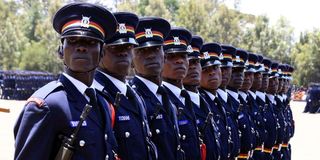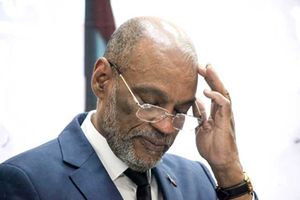
Police recruits march during a past passing-out parade at Kiganjo Training College in Nyeri County.
The Multinational Security Support (MSS) mission to Haiti which Kenya intends to lead is taking shape even as legal uncertainties remain about its deployment. The MSS differs from other UN peacekeeping missions because it is a policing mission deployed “on the understanding that the cost of implementing this temporary operation will be borne by voluntary contributions and support from individual Member States and regional organisations,” according to a UN Security Council resolution that authorised it in October last year.
Here are the rules the MSS should follow:
- It will not be drawing any monies from the UN Department of Peace Operations which routinely manages the blue helmets. Police troops will also not seek compensation from the UN on equipment spent, injuries incurred, or life lost.
- However, the MSS troops must work in strict compliance with international law, including, international human rights law.
- Kenya which will lead the Mission is supposed to ensure its officers, as well as those of peers in the MSS, have adequate child protection policy and focus on protecting all other vulnerable groups including during active operations against gangs.
- The MSS must work on the authority of the Haitian government, may include experts on anti-gang operations but also those involved in the softer side of law enforcement including community policing, prevention, and response to sexual and gender-based violence focused on protecting victims.
- Specific procedures on the force should be developed by all troop contributors but should be endorsed by the government of Haiti and should be in full respect of Haiti’s sovereignty and strict compliance with international law, including, international human rights law, as applicable.
- The government of Haiti must honour its obligations including cooperating fully with the MSS to execute its mandate by granting security and freedom of movement of the Multinational Security Support mission.
- Officers who violate the code on sexual and gender-based violence must undergo a set disciplinary procedure, which should be in place before the troops actually deploy.
- Officers who qualify for deployment must not have a criminal record of sexual offenses or gender-based violence. They should all be vetted.
- Troops must be comprised of adequate representations of women and all must undergo training on mission awareness to be able to detect crime incidents when they occur and ensure a safe survivor- and victim-centred response in cases of such conduct involving their personnel.
- There must be timely investigations into the conduct of troops as well as the protection of complainants. Perpetrators should be removed from the mission as soon as credible evidence is available of misconduct.
- Donations from willing member states to be channeled to the MSS via a Trust Fund established by the UN Secretary-General and which will aid operations and compensation for the Mission.
- Mission to deploy for 12 months starting October 2023.However, a review of its mandate is to be done from July 2024 to assess challenges and successes.
- Mission mandate includes ensuring the re-establishment of stronger and capable Haitian security forces and is geared towards ensuring adequate conditions for holding a free and fair election.









